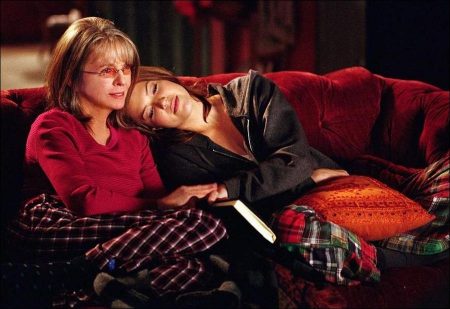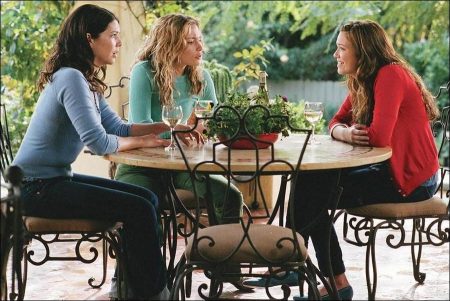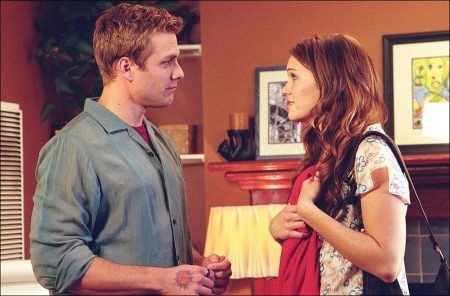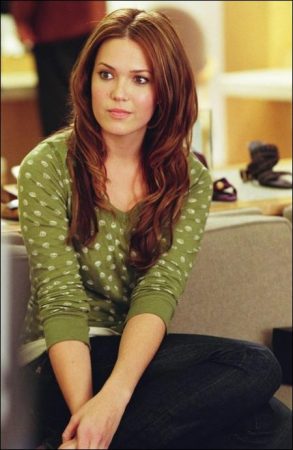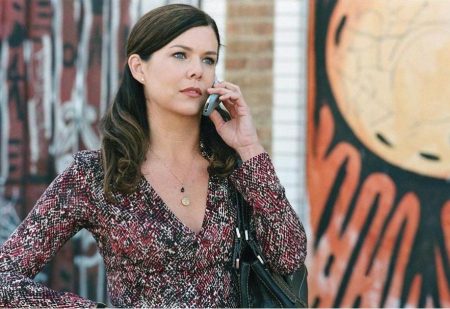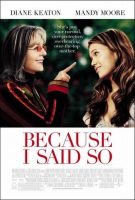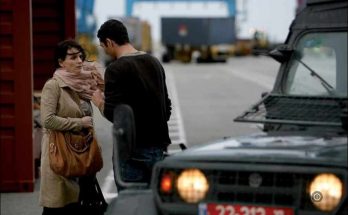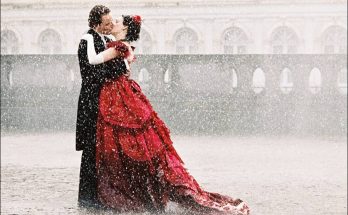Tagline: She’ just your normal, overprotective, overbearing, over-the-top mother.
Because I Said So focuses on Daphne (Diane Keaton), the loving but over-bearing mother of three girls, in particular Milly (Mandy Moore). Her other daughters Maggie (Lauren Graham) and Mae (Piper Perabo) are happily married but Milly has recently broken up with her boyfriend, and Daphne is concerned.
Daphne fears that her daughter cannot find a good man on her own so she secretly places a personal ad for her daughter. She finds a potential candidate, Jason (Tom Everett Scott), and tries to orchestrate a chance meeting of the two. The plan seems flawless until Milly finds her own date, guitarist Johnny (Gabriel Macht), who happens to be a candidate Daphne rejected before. Milly is unaware of her mother’s scheming and begins relationships with both Jason and Johnny at the same time, with neither aware of the other.
Inevitably, this double-dating takes its toll and Milly becomes estranged from both Jason and Johnny. In Jason’s case, it is because she discovers Daphne’s scheming. Meanwhile, Daphne stumbles upon her own perfect match after being alone for many years and begins to challenge her search for the ‘perfect’ match for Milly. Milly also realizes she has a choice to be the daughter her mother wants her to be, or to be the woman she wants herself to be. Choosing the latter, which comes with a row with her mother, leads her to reconcile with Johnny, a relationship Daphne has realized is what she should never have tried to orchestrate in the first place.
About the Production
Powerhouse actresses Diane Keaton, Mandy Moore, Lauren Graham and Piper Perabo serve up the laughs when they join wickedly funny director Michael Lehmann (“The Truth about Cats & Dogs,” “40 Days and 40 Nights,” “Heathers”) in his new film about cutting the apron strings, “Because I Said So.”
Keaton stars as Daphne Wilder, a mother whose love knows no bounds or boundaries. She is the proud mom of three daughters: stable psychologist Maggie (Graham), sexy and irreverent Mae (Perabo) and insecure, adorable Milly (Moore)-who, when it comes to men, is like psychotic flypaper.
In order to prevent her youngest from making the same mistakes she did, Daphne decides to set Milly up with the perfect man. Little does Milly know, however, that her mom placed an ad in the online personals to find him. Comic mayhem unfolds as Daphne continues to do the wrong thing for the right reasons…all in the name of love.
In a hilarious battle of strong wills, the mother-daughter dynamic is tested in all its fierce, wacky complexity. The girls help Daphne finally discover the truths and impossibilities of motherly love, all while trying to answer the questions: where does it begin and where should it end?
A Mother of an Idea
The idea for Because I Said So began with a routine dentist appointment. Coscreenwriter Karen Leigh Hopkins was passing time in the waiting room when she overheard the story of a mother who was proud of setting up her daughter on dates with men she believed to be quite eligible.
“I found the concept fascinating,” recalls Hopkins. “Here was a mother who desperately wanted to see her daughter married, but she was seeing her child make all the wrong decisions when it came to men. In the name of love, she decided to take matters into her own hands and blatantly pursue potential suitors for her daughter via the Internet…without her daughter’s knowledge. I thought, “There are limitless possibilities you could have with this in a movie.”
At the time, Hopkins was working with the film’s co-writer/producer, Jessie Nelson (who, like the Wilder daughters, has two sisters) on a different project. But once this idea of a modern-day yenta was fleshed out between the two, they realized the direction in which they wanted to put their creative focus and efforts.
Nelson comments, “Everybody has a mother, and though all mother/child relationships are unique, I have no doubt every mom in the world wants to see her kids healthy, happy, successful and in love with the right person. The meddling mother comic possibilities are endless, and all could be based upon real truths. Everyone can relate, which is why the project took on great momentum once we started moving forward.”
In creating the script, the writers simply wanted audiences to see their own lives reflected. Continues Nelson, “This is a movie about very flawed characters who learn and grow and step on each other’s toes along the way. But at the end of the day, they love one another fiercely. There’s a certain hilarity within family dynamics. If you peel back the layers of any family unit, there’s going to be black comedy there. This is about, at the end of the day, how insane love is—motherly love, sisterly love, romantic love. It’s messy and impossible, but that’s what makes it so incredible.”
After reading the screenplay from Nelson and Hopkins, Paul Brooks, president of Gold Circle Films, signed on for his company to further develop, finance and produce Because I Said So, with distribution from Universal Pictures. “I thought the script was very funny, warm and relatable,” Brooks notes. “I have a wife and a daughter, and I’ve always been fascinated by their relationship. The dynamic is just so different from men. I believe women will instantly relate to this film and the people in it, and blokes like me who have wives, mothers and daughters will recognize a lot of what’s going on…and perhaps even develop a sense of understanding!”
With a production partner in place, the team began looking for a director with the sensibilities needed to tell the story. Enter Michael Lehmann, a filmmaker whose previous body of work includes the celebrated cult classic Heathers and romantic comedies from 40 Days and 40 Nights to The Truth About Cats & Dogs. As with Brooks, Lehmann was intrigued by the screenplay’s take on the dynamics of a mother/daughter bond. “Obviously, I’d never experienced this kind of relationship firsthand,” he notes, “but I have two sisters and a wife and a daughter, so I’ve been exposed to it throughout my life. I know it’s an incredibly loaded relationship, and I thought that the story represented it in a way that rings very true.”
With the right director in place, Gold Circle was now ready to cast Because I Said So. All they needed were three gorgeous, talented daughters and a simultaneously lovable, exasperating and sexy mom to fit the bill. Keaton and Her New Daughters:
Casting the Film
Fortuitously, daughters would come to play an important part in the casting process. The film’s co-writer/producer, Jessie Nelson, grew to know Diane Keaton at the Los Angeles pre- school that their daughters attended. “We became friendly, because our connection was motherhood,” recalls Nelson. “It was our daughters who brought us together—an art-imitating-life thing. At the heart of my friendship with Diane is this common ground of the intense love we have for our children. So, it’s particularly fulfilling that we can explore this territory together in a film.”
Nelson discussed with Keaton the screenplay she had created with her writing partner, and the actor requested a copy. After she read the script, Keaton signed on to star in the project as the type-A mother-of-all-mothers, Daphne Wilder. Nelson and Hopkins knew they had found the embodiment of Daphne in Keaton. And, fortunately, they also found a solid collaborator. Hopkins recalls of Keaton’s script notes: “Diane’s input on the script was riveting to me because she’s so inside the story.”
“What she brings to the table is that she’s an extraordinarily fascinating human being with diverse interests. She’s a member of the Los Angeles Conservancy, a photographer and a brilliant director. Of course, she’s also a mother. Her notes were beautifully thought out, and she knows both what she does and what she can do.”
For her part, Keaton instantly related to Daphne. After reading Hopkins and Nelson’s script, the actor was intrigued by her character’s descent into comic madness as she tries to run her kids’ lives. Known for choosing roles that showcase both her comedy timing and dramatic flair, Keaton would fall effortlessly into the role.
Director Lehmann appreciated that his star instantly got Daphne. “It was clear from the way the script was conceived and the way the character was written that everything worked for Diane’s cadence and humor,” he relates. “Diane was perfect. When she came in and we heard her read lines for the first time, we all knew that this is exactly the kind of delivery you think about when you read the script, but Diane brought even more to it.”
After Keaton was in, it was understandably easy to find a plethora of talent eager to work with the Oscar-winning actor. The filmmakers next went about finding a trio of young women to play Daphne’s daughters—Milly, Maggie and Mae. With a character that was written as strong as Daphne, it would not be simple to find three magnetic, relatable personalities who could both have the right chemistry as sisters and be believable as her children.
“We cast Mandy first,” Nelson states. “We didn’t want to cast the other sisters until we knew who Milly was. Mandy came in and did an amazing reading and reinvented Milly. She’s got this beautiful purity and vulnerability, and we thought it would be interesting to shade her character that way.”
Moore admits that her desire to play the part was based on Keaton. “To be able to work with her in any capacity is just incredible,” she notes. “It’s not that working with Diane makes you want to raise your game; it just happens automatically. I would be the on-set caterer or do hair and makeup to be in a film with her.”
The actor also appreciated the script’s honest examination of the mother/daughter bond. “Daphne and Milly’s relationship reminds me so much of my relationship with my mom,” reflects Moore. “She sometimes drives me crazy, but at the end of the day…we’re best friends, and we love each other.”
After Moore as Milly was set, the filmmakers searched for the perfect actor to play the eldest Wilder daughter, Maggie. Notes Nelson, “When Lauren Graham came on board, we knew she’d be a great foil for Mandy’s character, who wears her heart on her sleeve. Maggie is a wisecracker—a seen-it-all, done-it-all kind of woman who can cut through a lot. Lauren exhibited that perfectly.”
Graham, who has spent the greater part of the past decade as Lorelai Gilmore on television’s critical darling Gilmore Girls, well knew the territory of a complex family dynamic. She, as with Moore, was eager to work with Keaton. The actor offers, “You want to be a pretend daughter worthy of that incredible wit and talent. Diane’s very alive and present, and just really thoughtful.”
Next cast, in the role of the middle daughter, wild-child Mae, was versatile actor Piper Perabo. “Piper brought a very different quality to this group of women, and we knew she was a fit,” Nelson says. “Once she was on board, we had created a wonderful, interesting family that we knew would translate on screen.”
Most surprising to Perabo was the camaraderie she found on set with her co-stars Moore and Graham. “We laughed and chatted right up until action,” she notes. “When Michael would yell ‘action,’ we were still laughing about our own off-camera jokes and carrying on the way you would with your siblings.”
What also piqued the interest of the newly cast Wilder women was the dialogue Hopkins and Nelson created among the women of the story. Because I Said So is replete with a number of frank girl talks about sex, husbands, boyfriends, shopping and female empowerment. The fact that the actresses formed a connection off set made the scenes feel even more organic.
In particular, some of the script’s risqué dialogue was rather eye-opening for Moore. She laughs, “I don’t normally speak as candidly with my mom and girlfriends about anatomy and whatnot…not like these women do. But I think it’s fun in a film to find out what else women do tend to talk about, and how they talk about it.”
Women set, the filmmakers would next look to cast the lead male roles of Johnny and Jason, Milly’s diametrically opposed suitors, who invite a litany of Daphne’s comments and critiques for Milly. The team wanted actors who could complement (and riff off) their very strong female counterparts while still maintaining a strong presence with their characters.
Director Lehmann explains: “When I became involved with the film, I thought the biggest casting challenge would be the guys. These are very well-defined parts. The guys are in the movie quite a bit, and they’re crucial for telling the story. However, they have to take second position to the girls in a number of scenes. I wanted to make sure we chose actors who were capable of having strength in those roles.”
Gabriel Macht was cast first as the bohemian lothario Johnny, a man whom Daphne decries “has heartbreak written all over him.” Of his onscreen sparring with Diane Keaton, the filmmakers noticed that one of the hardest things for Keaton to do was to act cruelly to Gabriel as Johnny, as Daphne initially believes he’s no good as a mate for her daughter.
“He was the first person we read for the role,” says Lehmann, “and Gabriel quite simply nailed the part in his reading.”
Macht looked forward to working with Lehmann. “Michael directed one of my favorite films, Heathers, and a number of episodes of The Larry Sanders Show, which is just genius,” the actor offers. “He knows comedy, how to get the laugh. I just respond well to his direction.”
For the role of straight-laced, conservative Jason, the filmmakers went into the casting process wide-open, ready to look at a number of actors’ interpretations. “Tom Everett Scott was not the first person to read for the role,” remembers Lehmann. “But he was the one who came in and defined it for us.
“I felt it was important that Jason not just be a bad person,” Lehmann continues. That would oversimplify things and not be true to life. If we did that, Milly would have no real choice to make. We wanted to have Tom play Jason as someone who is ultimately sympathetic, but just the wrong choice for Milly. Tom has a great way of doing that; he never went with the ‘villain within’ approach.”
Scott agrees with Lehmann’s evaluation of the character. “I believe they cast me because they wanted the audience to feel like Milly could end up with this guy. Then it’s something of a surprise when he’s not so Mr. Perfect.”
Finally, the filmmakers looked to Stephen Collins to play the ruggedly handsome Joe, Jason’s father and Daphne’s new romantic interest. Collins, well-known for his long run as Reverend Eric Camden on the series 7th Heaven, may also be seen in this season’s Leonardo DiCaprio thriller, Blood Diamond. But audience members who well know their Diane Keaton film history will remember him for his turn as the snarky, cheating husband of Keaton’s character, Annie Paridis, in The First Wives Club. Of his decision to take the role, Collins offers, “Come on… another chance to kiss Diane and get paid for it? Sign me up.”
Singing For Their Dessert: Notes From the Set
Principal photography for Because I Said So began on December 5, 2005, and the production was lensed at multiple locations across Los Angeles, California. The team zigzagged across the southland, from the Japanese American National Museum—where Milly meets Jason at a cocktail party she caters—and the hills of Benedict Canyon— where Milly and Jason share a romantic night in the architect’s home—to the beach city of Venice, where Good Enuf to Eat (Milly’s catering business) is located, L.A. became the backdrop for the film. Just down the street, Milly’s other lover, Johnny, resides with his young son in the Canal district of Venice. Johnny’s music shop is located across town in the up-and-coming Eagle Rock area near Silver Lake.
Milly’s loft was created in downtown Los Angeles, and the Wilder women were found on yet another shopping trip to Neiman Marcus on Wilshire Boulevard in the heart of Beverly Hills. Daphne’s bakery was shot in the city of Brentwood, while her cozy home was lensed in the Hancock Park area.
To complement the copious amounts of on-set girl talk (all to get into character, of course) found on the L.A. sets, the cast was given a chance to share an additional bonding experience: singing with one another onscreen. In two of the film’s key sequences, the Wilder women make up an impromptu quartet.
“Music was always a big part of this movie,” comments Lehmann. “I knew from the start how well Diane sang (recall her surprisingly good rendition—with Bette Midler and Goldie Hawn—of Leslie Gore’s “You Don’t Own Me” in The First Wives Club), so we were trying to find ways to incorporate that. There was much discussion about what kind of music it should be. When we cast Mandy, it was an extra bonus that she was a great singer.”
During Lauren Graham’s audition, Lehmann and the producers were pleased to discover that she also could sing well. Graham had been part of an a cappella group in college and knew she could handle the film’s musical pieces; she was especially enthusiastic. “One of the numbers is a four-part harmony, which is no walk in the park,”
Graham recalls. “It’s been fun, because I’ve gone into a recording studio and performed the songs live. It’s something else I love about movies—I want people breaking into song all the time, whether it’s appropriate or not.”
“I don’t even know if we asked Piper if she could sing,” Lehmann continues. “We figured we had two or three good singers already in the group, so we were set. Then we had a recording session for the first song, and when Piper showed up, she just fell right in and did wonderfully.”
Her co-stars’ vocal talents impressed Moore, the seasoned professional of the fledgling group. “Everybody can sing quite well,” she commends. “We joked around that we should make it a girl quartet and take this show on the road. I’m such a softie for those singing moments in romantic comedies. I think it’s perfect that we have not just one, but two, in our film.”
When not on stage, it was back to work for the Wilder women. While Maggie stays quite busy as a psychologist and Mae stays busy getting into mischief, Daphne is self-employed as a cake baker/decorator and Milly works in the aforementioned catering business. As Daphne and Milly’s culinary workplaces are key elements to Hopkins and Nelson’s script, the team quickly realized it had to enlist professional assistance to help with the sweeter aspects of the film.
They looked no further than The Cake Divas, who were brought on board by a set prop master who had worked with the bakers on a previous project. Also known as Leigh Grode and Joan Spitler, the Divas have owned their Los Angeles-based custom dessert company since 1998, creating signature cakes for numerous films and television shows.
Originally, they were hired to simply bake the cakes. But after further discussions with the producers about Keaton’s character, the filmmakers suggested that Spitler serve as Keaton’s “decorating double” for scenes in which Daphne is showcasing a flair for frosting. Subsequently, the Divas were asked to serve on screen as Daphne’s bakery assistants.
“The overall theme of the cakes for this movie is about expressing Daphne’s style,” offers Spitler. “We read the script, and we went through and made sketches for each cake and came up with different ideas to reflect each different character in the film.”
****
Harmonizing and far too many Cake Diva slices completed, the Wilder women said goodbye to principal photography on February 3, 2006. “We’ve had such a good time,” recalls Graham. “That’s a bonus when you’re playing a family, because it comes through. It’s become this girl fest, every cliché you don’t want to be. We basically talk about boys and shopping all day.”
Comedy, romance, sex, musical numbers and baked goods aside, the core of Because I Said So examines one of the most primal universal forces: parental love. Producer/co-writer Jessie Nelson concludes: “Diane, Karen and I loved the line in the script in which Daphne says that motherhood is such an impossible love. You want to hold your children so tight and protect them from being hurt. But as a mother, you know that it’s only when your children fall that they learn how not to fall once again.”
Because I Said So (2007)
Directed by: Michael Lehmann
Starring: Diane Keaton, Mandy Moore, Neil Hopkins, Piper Perabo, Colin Ferguson, Laureen Graham, Matt Champagne, Stephen Collins, Karen Leigh Hopkins, Sophina Brown
Screenplay by: Karen Leigh Hopkins
Production Design by: Sharon Seymour
Cinematography by: Julio Macat
Film Editing by: Paul Seydor, Troy Takaki
Costume Design by: Shay Cunliffe
Set Decoration by: Maggie Martin
Art Direction by: Christopher Tandon
Music by: David Kitay
MPAA Rating: PG-13 for sexual content including dialogue, mature thematic material and partial nudity.
Distributed by: Universal Pictures
Release Date: February 2, 2007
Views: 98
